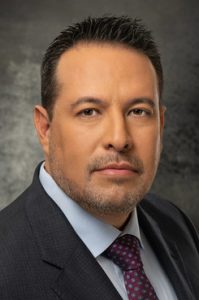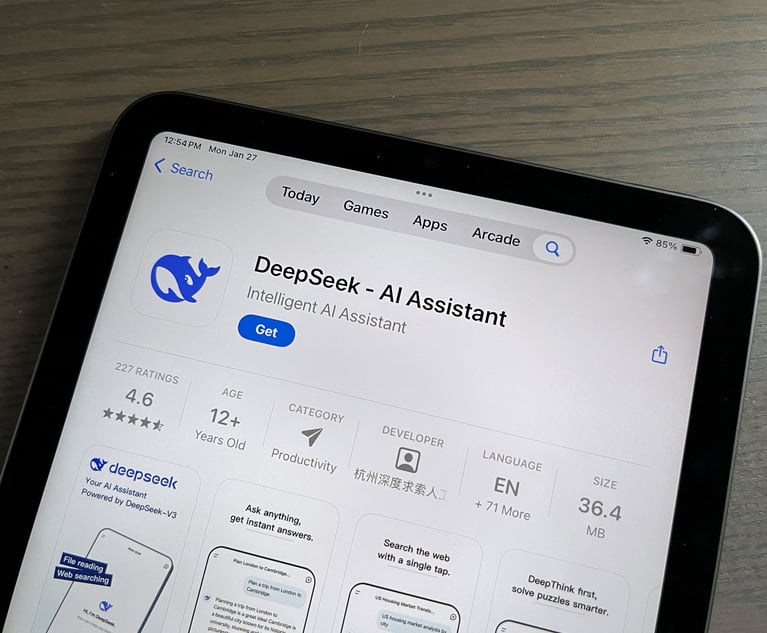A Firm Implemented a 4-Day Workweek and Hasn't Looked Back
The shorter workweek is getting another look following a report by Microsoft Japan that found productivity jumped 40% after the company switched to a four-day week.
November 07, 2019 at 05:21 PM
6 minute read
The original version of this story was published on The American Lawyer
 Photo: Shutterstock.com
Photo: Shutterstock.com
Walter Benenati, managing partner and founder of Orlando, Florida-based Benenati Law, kicked off 2019 by shortening the workweek at his 24-employee firm to four days.
He regards it as one of the best decisions of his life. Fridays are spent with his family, taking his 3-year-old daughter to gymnastics and cooking a late brunch. His employees use Fridays to run errands and go to doctor appointments they previously had to either squeeze into the workday or take a precious day off.
The four-day workweek is getting another look following news that Microsoft reported a 40% increase in productivity after the company instituted the abbreviated week in a trial project. The shortened week is also getting a nod from the United Kingdom's Labour Party, which has absorbed the policy into its political platform.
 Walter Benenati
Walter BenenatiLike Microsoft, Benenati has seen positive results from his shortened workweek. The personal injury and bankruptcy lawyer says he is as competitive as they come—a necessity because personal injury giant Morgan & Morgan is based in the same city. But the firm has not suffered as a result of the shortened week. Monthly retention numbers haven't dropped, and office morale and productivity are up, he said.
"I always want to be the one getting all the business, but I realized it's so important to be able to pick up your kid and see your wife on Friday," Benenati said. "Productivity is better because everything needs to be done by Thursday and people are fully refreshed after a three-day weekend."
The firm's employees do not work fewer hours per week than they would if they worked five days. Its five attorneys, as well as 14 of its 19 staff, work 10-hour days instead of the typical eight, starting at 8 a.m. and ending at 6 p.m., to ensure billing doesn't drop and "everybody still gets their 40 hours," Benenati said.
Four staff members and one case manager work the traditional five-day week because they preferred to work until 5 p.m., Benenati said. And every Friday, one attorney is rotated in to field any consultations or incoming work.
To be sure, large firms may not have the same level of flexibility as Benenati's firm to implement an abbreviated week, and experts see little chance of a four-day week becoming the legal-industry standard. But a shortened week does address some of the biggest mental health and morale challenges law firm employees face.
Chief among these is the stigma surrounding taking time off. Vacation time, flexible work hours and paid parental leave have become near-standard as firms have looked to recruit top-flight young talent and retain women attorneys. But these resources often go untapped, said Lauren Rikleen, president of the Rikleen Institute for Strategic Leadership.
"One of the biggest problems right now with the way flexibility is provided in the profession is that it always comes with a stigma attached," Rikleen said. "We live in a world where flexibility is a lot easier to implement than people feel it is, yet we still hear issues around the stigma concern that comes with it."
In most work environments, attorneys who have a flexible schedule size up their workload by comparing it with colleagues who work a different schedule. But an environment in which people have a uniform day and an abridged week eliminates the comparison and weakens the stigma, she said.
"We know that there's no one-size-fits-all but the intriguing thing about this model is that it reduces the one barrier of flexible scheduling because everybody has this schedule and nobody is seen as less committed for not participating," Rikleen said.
Debbie Epstein Henry, a legal consultant and co-founder of Bliss Lawyers, finds the Friday rotational schedule implemented by Benenati intriguing. For years, Henry has argued that attorneys should be more open to "job shares"—a work scheme standard among doctors as well as in-house, not-for-profit and government attorneys.
Employing a job share schedule in which two attorneys are up-to-speed on the same matters and fill in for each other allows attorneys to enjoy their vacation or parental leave without guilt and the need to constantly check phones and emails—a much-maligned aspect of the job that Henry refers to as the inability to go "off call."
"Attorneys used to go to the ends of the earth where they couldn't get cell-service to finally be able to unplug," Henry said. "Cell service is too good now, and there needs to be an effective mechanism to allow attorneys to be off call."
Henry said job-sharing arrangements are even easier at big law firms, as such firms already staff multiple attorneys on matters. Under job sharing, two mid-level associates would be assigned to the same big case and both would be tasked with consuming and memorizing the relevant facts and case law. They would both be copied on all the emails and they would attend the same meetings.
When one of the associates needs to go on vacation, having the other fill in allows the attorney to enjoy the time away and take time off guilt-free, as both attorneys are already caught up on the case. This idea, Henry believes, can be applied to almost any employment situation.
Naysayers are likely to insist that the practice of law is unique and these work arrangements cannot work the way they do in other businesses. But Henry doesn't buy that argument.
"If it works for matters of life and death, as with doctors and nurses, why wouldn't it work for attorneys?" she said.
But, again, nobody has illusions of widespread adoption of a four-day week in the legal profession, regardless of its merits.
"Law firms aren't going to be trailblazers," said Nathan Peart, a consultant at Major, Lindsey & Africa. "Look at how long diversity is taking, even though there's client backing for it."
Peart said flexible scheduling is a great thing for lawyers, but he says that flexibility should lie with the individual, not the firm. He also noted that Microsoft Japan's policy relied heavily on better technology and efficiency practices that can be adopted by firms without going to a four-day week—keeping meetings to less than 30 minutes, for example.
"Maybe not everybody would want Friday off. Maybe Wednesday or Monday would be better for some," Peart said. "Investing more in technology and group cooperation and policies could achieve the same results."
Similar Stories:
Do Associate Perks Make a Difference in the Law Firm Talent War?
This content has been archived. It is available through our partners, LexisNexis® and Bloomberg Law.
To view this content, please continue to their sites.
Not a Lexis Subscriber?
Subscribe Now
Not a Bloomberg Law Subscriber?
Subscribe Now
NOT FOR REPRINT
© 2025 ALM Global, LLC, All Rights Reserved. Request academic re-use from www.copyright.com. All other uses, submit a request to [email protected]. For more information visit Asset & Logo Licensing.
You Might Like
View All
Eighth Circuit Determines No Standing for Website User Concerned With Privacy Who Challenged Session-Replay Technology
7 minute read
The Time Is Now for Employers to Assess Risk of Employees’ Use of DeepSeek
4 minute read
Fired by Trump, EEOC's First Blind GC Lands at Nonprofit Targeting Abuses of Power
3 minute read
Houston Law Firm Files $250K Breach of Contract Suit Against 2 Former Lawyers
3 minute readTrending Stories
- 1Public Notices/Calendars
- 2Wednesday Newspaper
- 3Decision of the Day: Qui Tam Relators Do Not Plausibly Claim Firm Avoided Tax Obligations Through Visa Applications, Circuit Finds
- 4Judicial Ethics Opinion 24-116
- 5Big Law Firms Sheppard Mullin, Morgan Lewis and Baker Botts Add Partners in Houston
Who Got The Work
J. Brugh Lower of Gibbons has entered an appearance for industrial equipment supplier Devco Corporation in a pending trademark infringement lawsuit. The suit, accusing the defendant of selling knock-off Graco products, was filed Dec. 18 in New Jersey District Court by Rivkin Radler on behalf of Graco Inc. and Graco Minnesota. The case, assigned to U.S. District Judge Zahid N. Quraishi, is 3:24-cv-11294, Graco Inc. et al v. Devco Corporation.
Who Got The Work
Rebecca Maller-Stein and Kent A. Yalowitz of Arnold & Porter Kaye Scholer have entered their appearances for Hanaco Venture Capital and its executives, Lior Prosor and David Frankel, in a pending securities lawsuit. The action, filed on Dec. 24 in New York Southern District Court by Zell, Aron & Co. on behalf of Goldeneye Advisors, accuses the defendants of negligently and fraudulently managing the plaintiff's $1 million investment. The case, assigned to U.S. District Judge Vernon S. Broderick, is 1:24-cv-09918, Goldeneye Advisors, LLC v. Hanaco Venture Capital, Ltd. et al.
Who Got The Work
Attorneys from A&O Shearman has stepped in as defense counsel for Toronto-Dominion Bank and other defendants in a pending securities class action. The suit, filed Dec. 11 in New York Southern District Court by Bleichmar Fonti & Auld, accuses the defendants of concealing the bank's 'pervasive' deficiencies in regards to its compliance with the Bank Secrecy Act and the quality of its anti-money laundering controls. The case, assigned to U.S. District Judge Arun Subramanian, is 1:24-cv-09445, Gonzalez v. The Toronto-Dominion Bank et al.
Who Got The Work
Crown Castle International, a Pennsylvania company providing shared communications infrastructure, has turned to Luke D. Wolf of Gordon Rees Scully Mansukhani to fend off a pending breach-of-contract lawsuit. The court action, filed Nov. 25 in Michigan Eastern District Court by Hooper Hathaway PC on behalf of The Town Residences LLC, accuses Crown Castle of failing to transfer approximately $30,000 in utility payments from T-Mobile in breach of a roof-top lease and assignment agreement. The case, assigned to U.S. District Judge Susan K. Declercq, is 2:24-cv-13131, The Town Residences LLC v. T-Mobile US, Inc. et al.
Who Got The Work
Wilfred P. Coronato and Daniel M. Schwartz of McCarter & English have stepped in as defense counsel to Electrolux Home Products Inc. in a pending product liability lawsuit. The court action, filed Nov. 26 in New York Eastern District Court by Poulos Lopiccolo PC and Nagel Rice LLP on behalf of David Stern, alleges that the defendant's refrigerators’ drawers and shelving repeatedly break and fall apart within months after purchase. The case, assigned to U.S. District Judge Joan M. Azrack, is 2:24-cv-08204, Stern v. Electrolux Home Products, Inc.
Featured Firms
Law Offices of Gary Martin Hays & Associates, P.C.
(470) 294-1674
Law Offices of Mark E. Salomone
(857) 444-6468
Smith & Hassler
(713) 739-1250








